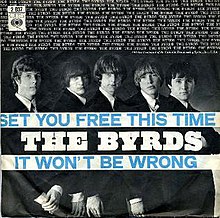It Won't Be Wrong
| "It Won't Be Wrong" | ||||
|---|---|---|---|---|

Side label of the US vinyl release
|
||||
| Single by The Byrds | ||||
| from the album Turn! Turn! Turn! | ||||
| A-side | "Set You Free This Time" | |||
| Released | February 18, 1966 | |||
| Format | 7" single | |||
| Recorded | September 10, September 14–16, 1965 | |||
| Studio | Columbia Studios, Hollywood, CA | |||
| Genre | Folk rock, pop | |||
| Length | 1:58 | |||
| Label | CBS | |||
| Songwriter(s) | Jim McGuinn, Harvey Gerst | |||
| Producer(s) | Terry Melcher | |||
| The Byrds singles chronology | ||||
|
||||
| Alternative release | ||||

1966 Dutch picture sleeve of "Set You Free This Time/It Won't Be Wrong"
|
||||
"It Won't Be Wrong" is a song by the American folk rock band The Byrds, which appeared as the second track on their 1965 album, Turn! Turn! Turn! It was written in 1964 by band member Jim McGuinn and his friend, Harvey Gerst, an acquaintance from McGuinn's days as a folk singer at The Troubadour folk club in West Hollywood, California. The song had originally appeared under the alternate title of "Don't Be Long" on the B-side of a single that The Byrds had released on Elektra Records in October 1964, under the pseudonym The Beefeaters. By the time that the song was re-recorded in September 1965, during the recording sessions for The Byrds' second Columbia Records' album, its title had been changed to "It Won't Be Wrong".
Lyrically, the song is a relatively simplistic appeal for a lover to submit to the singer's romantic advances. Musically, however, the guitar riff following each verse foreshadows the raga experimentation of the band's later songs "Eight Miles High" and "Why", both of which would be recorded within three months of "It Won't Be Wrong". The Byrds' biographer, Johnny Rogan, has described the difference between the earlier Beefeaters' recording of the song and The Byrds' Columbia version as remarkable. Rogan went on to note "The lackluster Beefeaters' version was replaced by the driving beat of a Byrds rock classic, complete with strident guitars and improved harmonies, that transformed the sentiments of the song from an ineffectual statement to a passionate plea." Both the band and their producer Terry Melcher also felt that the version included on the Turn! Turn! Turn! album was far more accomplished and exciting than the earlier recording of the song.
...
Wikipedia
